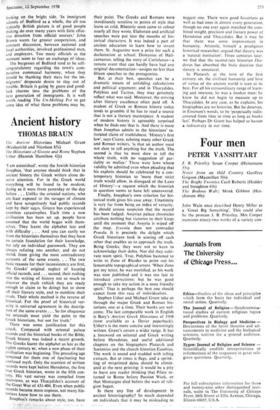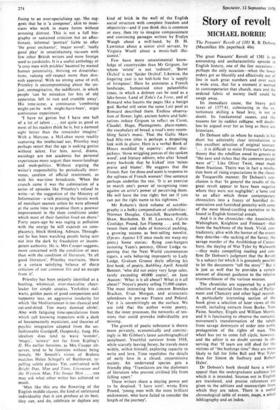Four men
PETER VANSITTART
1. B. Priestley Susan Cooper (Heinemann 55s) Notes from an Odd Country Geoffrey Grigson (Macmillan 50s) The Bright Twenties Cecil Roberts (Hodder and Stoughton 63s) The Brahms Waltz Monk Gibbon (Hut- chinson 40s) John Wain once described Henry Miller as a 'Great Big Something'. This could also be the protean J. B. Priestley. Mrs Cooper mentions ninety-two works of a variety con- fusing to an over-specialising age. She sug- gests that he is 'a composer', akin to musi- cians who work in many forms without arousing distrust. This is not a full bio- graphy or sustained criticism but an affec- tionate, informal 'portrait' liable to offer 'the great enchanter:, 'major novel', 'really good play' in unsatisfactory, vacuum with few other British writers and none foreign used as yardsticks. It is a useful anthology of 'a cosy man with prickles' haunted by wasted human potentiality, thriving on dissatisfac- tions, valuing self-respect more than don- nish approval. With no strong sense of evil, Priestley is uncompromising about the un- just, unimaginative, the indifferent, in which people 'can be mistaken for bits of old apparatus, left to rust and crumble away'. His time-sense, a continuous 'combining might-yet-be with might-have-been', urges continuous experiment.
'I have no genius but I have one hell of a lot of talent . . . not quite as good as most of his readers think he is, but a damned sight better than the remainder imagine.' With a Marcuse, a McLuhan more readily capturing the intellectual ear, Priestley may perhaps retort that the age is seeking genius without talent. For him, novel, drama, sociology are not academic but personal experiences more urgent than moon-landings and mob-politics. Without arguing the writer's responsibility he periodically inter- venes, careless of official resentment, as with his war-time broadcasts. 'When the crunch came it was the culmination of a series of episodes like Priestley's refusal to write—at the suggestion of the Ministry of Information—a talk praising the heroic work of merchant seamen unless he were allowed at the same time to promise them a postwar improvement in the slum conditions under which most of their families lived on shore.' Forty years-ago he was raging at pollution with the energy he still expends on com- placency, block thinking, Admass. Through- out he has been watching people being sent out into the dark by fraudulent or incom- petent authority. He is, Mrs Cooper suggests, more concerned with the condition of man than with the condition of literature. 'In all good literature', Priestley maintains, 'there is a certain satisfying balance of sharp criticism of our common life and an escape from it'.
Priestley has been unjustly identified as a bustling, whimsical, over-masculine cheer- leader for simple utopias, Yorkshire stal- warts, golden pasts of good companions and tuppenny teas, an aggressive insularity for which 'the Mediterranean is too classical and cut-and-dried. Too many damned olives'. Also with fatiguing time-speculations from which call knowing inspectors with a dash of housemasterly mysticism, and theories of psychic integration adapted from the un- fashionable Gurdgieff, Ouspensky, Jung. His idealism does tend to wave 'wonder', 'magic', 'ecstasy' not far from Kipling's If. His earlier heroines, as Mrs Cooper ob- serves, tend to be feminine without being female, Mr Smeeth's vision of Brahms matches Helen Schegel's of Beethoven, re- pelling subtle palates. Yet, confronted with Bright Day, Man and Time, Literature and the Western Man, The Image Men . . . one may ask what other writer has achieved so much.
'Men like this are the flowering of the English middle classes, the kind of unfettered individuality that it can produce at its best; they can, and do, celebrate or deplore any kind of brick in the wall of the English social structure with complete freedom and objectivity—and if you think this is common or easy, then try to imagine compassionate and convincing passages written by Evelyn Waugh about a mill-hand, by D. H. Lawrence about a senior civil servant, by Virginia Woolf about a music-hall illu- sionist.'
Few have more unsentimental know- ledge of countrysides than Mr Grigson, for whom 'oriole' is not 'redstart', 'Burnt Orchid' is not 'Spider Orchid'. Likewise, the lingering past is no bolt-hole but 'a supply of livingness'. Here he annotates a French landscape, humanised since palaeolithic times, in which a dolmen can be used as a lake-house. Land of Zola's La Terre, and of Ronsard who haunts the pages like a benign god. Barbel still swim the same Loir pool as Ronsard described them. Endless observa- tion of flower, light, ancient habits and habi- tations induce Grigson to reflect on Corot, Claudel, Hugo, Plantagenets, place-names, the vocabulary of bread, a toad's note resem- bling Satie's music. That the Gallic Mars had fifty-two titles is perhaps a despairing link with la gloire. Here is a verbal Book of Hours modified by asperity: about disc- jockeys, 'those wriggling ponces of the spoken word', and literary editors, who alter 'kissed every backside that he kicked' into 'mixes praise and blame'. He suggests that the French flair for dress and scent is response to the ugliness of French women! One sentence perhaps underlies the rest. 'It is an exercise to match one's power of recognising trees against an artist's power of perceiving them. He will have the tree right; but see if you can put the right name to his rightness.'
Mr Roberts's third volume of autobio- graphy is a bulky compendium of celebrities: Norman Douglas, Churchill, Beaverbrook, Shaw, Beerbohm, D. H. Lawrence, Calvin Coolidge, Pound, Ian Fleming . . . and, be- tween them and slabs of historical padding, a growing success as best-selling novelist. (Spears Against US once made me weep my pints.) Some stories: flying coat-hangers restoring Yeats's potency, Oliver Lodge re- porting that the Next World countenances cigars, a sofa behaving improperly to Lady Lodge, Graham Greene shyly offering his first book, of pOetry, Babbling April; Arnold Bennett, 'who did not enjoy very large sales, rarely exceeding 40,000 copies', on Jane Austen: 'What is it all about? What is it all about?' Noyes's poetry selling 53,000 copies. The most interesting bits concern Brendan Bracken, Evan Morgan, and aristocratic splendours in pre-war France and Poland. Yet it is unremittingly on the surface. We are told that the author wrote poetry, but the inner processes, the networks of ten- sions that could provoke individuality are missing.
The growth of poetic substance is shown more privately, economically and convinc- ingly in Mr Gibbon's latest autobiographical instalment. Youthful survivor from 1918, while scarcely leaving Jersey, he travels more widely, within himself, exploring capacity to write and love. Time repolishes the details of early love in a closed, unpermissive society. An underrated species gets a friendly plug. 'Translators are the diplomats of literature who prevent civilised life from falling apart.'
These writers share a staying power not to be despised. 'I have seen', wrote Ezra Pound, 'young men with the most brilliant endowment, who have failed to consider the length of the journey'.















































 Previous page
Previous page